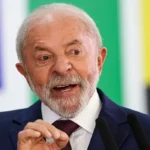
Finance Minister announces a new round of negotiations with the US to try to reverse tariffs that reach strategic products such as meat and steel
Finance Minister Fernando Haddad announced on Thursday (31) that Brazil will intensify diplomatic efforts to reverse the 50% rate on Brazilian presidents determined by US President Donald Trump. According to Haddad, there is a willingness on the American side for a new dialogue, and a meeting with US Treasury Secretary Scott Bessent is already being organized.
“We will bring to the American authorities our point of view and resort to due instances, both in the US and in international bodies,” the minister said when he arrived at the Ministry of Finance.
Read too
Sovereignty makes Lula trig
Oil War hits Indian bombs
USA attack Chinese terminal and acir oil war
The US measure, which comes into force on August 6, affects several sectors of the Brazilian economy, especially agricultural and industrial products that were not included in the list of almost 700 exceptions released by Washington. Among the items that are still charged is beef, considered strategic for the Brazilian trade balance.
Haddad acknowledged that the exemption list represents a partial advance in negotiations, including important products such as Embraer’s orange juice, oil and aircraft. Even so, the minister classified as “unfair” the measures that affect fundamental sectors of the national economy.
Contingency plan will be announced in the coming days
Faced with the prospect of impacts on national employment and industry, the government prepares a contingency plan to protect the most affected sectors. The measure is in the final stages of preparation and will be sent to the Civil House in the coming days. The package should include both commercial measures and actions to strengthen the competitiveness of Brazilian products in the international market.
The US decision to impose the fare coincided with the inclusion of Federal Supreme Court Minister Alexandre de Moraes on the list of sanctions of the Magnitsky Law, used by Americans to punish foreign authorities accused of human rights violations. Bessent accused Moraes of acting “arbitrarily against freedom of expression”, in reference to the processes involving former President Jair Bolsonaro.
Moment Mark Start of more rational dialogue, evaluates Haddad
For Haddad, the current moment represents the beginning of a more balanced phase in relations between the two countries. “Nothing that was decided yesterday cannot be reviewed. This week is the beginning of a more sober, less in love conversation. It is also an opportunity to explain how our judiciary works,” said the minister.
Government sources point out that the postponement of the implementation of the tariff and the partial exemptions won indicate important, albeit limited advances. According to these sources, Brazilian and American diplomats, as well as representatives of the business sector of both countries, played a key role in containing damage, helping to depolitimate conflict.
Despite the positive signs, the economic team keeps caution. Trump administration is considered unpredictable, and Planalto interlocutors evaluate that any negotiation will require care not to aggravate the commercial crisis. The central concern is to preserve Brazil’s position in global productive chains and avoid deeper impacts on the national economy.
With information from the federal government and the economic team, Brazil prepares for a new phase of negotiations that can define the course of business relations with one of its main international partners.
Finance Minister Fernando Haddad again pronounced on Wednesday (30) about the commercial crisis between Brazil and the United States, stating that the tension generated around the announcement of US tariffs is artificial and will tend to dissipate in the coming weeks. According to him, Brazil continues to seek dialogue with the American authorities and believes that rationality will prevail over political polarization.
“If it depends on Brazil, this tension disappears, because it is artificial. And produced by people in the country. That is, it makes no sense Brazilians to feed this tension. This tension will dissipate and, when dissipating, rationality will preside over the work, and we will reach a common denominator,” Haddad said in conversation with journalists at the Ministry of Finance, in Brasilia.
The minister made a direct reference to Deputy Eduardo Bolsonaro (PL-SP), who graduated from the term in March to work in the United States in articulations against the Brazilian justice. Eduardo Bolsonaro, who is investigated by the Federal Supreme Court (STF) for his actions in defense of former President Jair Bolsonaro, has been appointed as one of the central figures in escalating the diplomatic crisis between the two countries.
The tension gained a new breath on July 9, when President Donald Trump sent a letter to President Lula announcing the imposition of a 50% rate on all Brazilian products from August 1. In justification, Trump specifically quoted the Bolsonaro case and asked the former president for the former president.
Haddad stressed that Vice-President and Minister of Development, Industry, Commerce and Services, Geraldo Alckmin, is in charge of negotiations with the US government. According to the minister, Alckmin maintains constant contact with US Secretary of Commerce, Howard Lutnick, in an attempt to find solutions to the crisis.
“It is necessary to wait on August 1 to understand what, in fact, it will come into force, as the US government did not officially respond to the Brazilian government proposals,” Haddad explained, noting that the conversations are still underway and that the Brazilian government awaits clearer definitions of the American authorities.
The Finance Minister also revealed that he has been trying to contact United States Treasury Secretary Scott Bessent, who is currently in Europe negotiating other international agreements. “His advisory said he has the possibility of a conversation when he returns to the United States,” he said.
Haddad stressed that Brazil is prepared to deal with the impacts of the measures if they are effectively implemented, but stressed that the government’s preference is to find a diplomatic solution that preserves trade relations between the two countries.
“We are keeping the communication channel open and seeking a resolution that is beneficial to both sides. Brazil does not want a trade war, or a constructive dialogue,” concluded the minister.
With Haddad’s statements, the Brazilian government signals that, despite the severity of the measures announced by the US, it maintains the expectation that the crisis can be exceeded through dialogue and diplomatic mediation.
With information from ICL and Agência Brasil
Source: https://www.ocafezinho.com/2025/07/31/tarifa-de-trump-vira-batalha-diplomatica-de-haddad/

